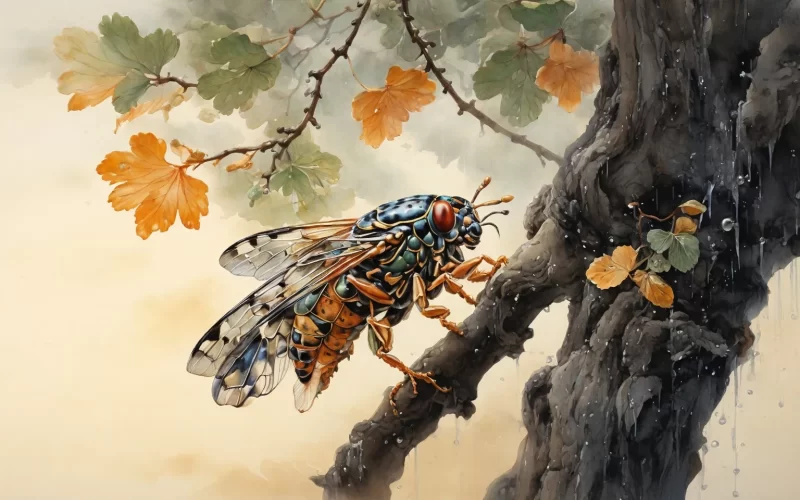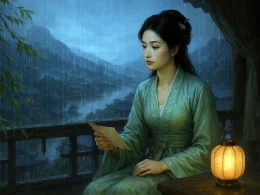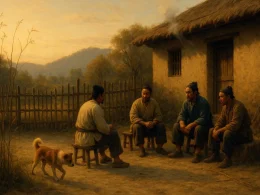Though rising high, you drink but dew;
Yet your voice flows from sparse plane trees.
Far and wide there's none but hears you;
You need no wings of autumn breeze.
Original Poem
「蝉」
虞世南
垂緌饮清露,流响出疏桐。
居高声自远,非是藉秋风。
Interpretation
This poem was composed in the early Tang Dynasty, representing the earliest documented cicada poem in Chinese literature and has been highly revered through the ages. As one of the Twenty-Four Meritorious Officials of Lingyan Pavilion, Yu Shinan was not only renowned for his calligraphy but also a statesman of refined literary cultivation. Likely written during his retirement or semi-retirement in later years, the poem employs the cicada as a vehicle for self-expression, conveying his moral integrity and incorruptible character despite holding high office. The work carries distinct allegorical significance while embodying the Confucian ideals of moral conviction and personal cultivation.
First Couplet: "垂緌饮清露,流响出疏桐。"
Chuí ruí yǐn qīng lù, liú xiǎng chū shū tóng.
With dangling tassels it sips crystal dew,
Its pure resonance flows through sparse phoenix trees.
While ostensibly depicting the cicada's form and habitat, this couplet carries profound symbolic meaning. The "dangling tassels" evoke official headwear, while "sipping crystal dew" symbolizes untainted virtue beyond worldly temptations. The insect's pure tones emanating from "sparse phoenix trees" suggest transcendent spirituality, creating imagery that blends visual elegance with moral luminosity in pristine poetic economy.
Second Couplet: "居高声自远,非是藉秋风。"
Jū gāo shēng zì yuǎn, fēi shì jiè qiū fēng.
From heights attained, its voice carries afar—
No need to borrow autumn winds' conveyance.
The poem's climactic revelation transforms entomological observation into philosophical statement. The cicada's elevated position ("heights attained") becomes metaphor for moral stature, its unaided resonance ("no need to borrow") asserting the Confucian ideal of self-cultivation's inherent power. Through this insectival allegory, the poet articulates a vision of transcendent integrity where authentic virtue requires no external validation, embodying the classic junzi (gentleman) ideal of quiet self-sufficiency. The couplet's structural parallelism—affirmation followed by negation—perfectly reinforces its message of autonomous moral authority.
Holistic Appreciation
This poem stands as a paradigm of lyrical allegory, its four compact lines resonating with profound meaning. The opening couplet establishes an aesthetic tableau through precise imagery, presenting the cicada as an emblem of purity. The subsequent lines anthropomorphize the insect, transforming its song from mere natural phenomenon into a symbol of moral integrity and aspiration. The concluding aphorism—"from heights, sound carries far"—elevates the theme, asserting that true renown stems from noble character rather than external power. This technique of using objective correlatives to reflect spiritual ideals not only elevates the poem's artistic register but also deepens its philosophical import, rendering these twenty words an enduring masterpiece of epigrammatic wisdom.
Artistic Merits
- Philosophy Embodied in Imagery: While ostensibly depicting cicadas, each line projects human virtues, particularly the axiomatic final verse which has become proverbial.
- Architectonic Progression: The first couplet constructs physical context, the second transcends to metaphysical insight, creating organic rhythmic development.
- Layered Symbolism: "Pure dew" and "autumn wind" function dually as natural elements and metaphors for integrity, solitude, dependence and autonomy, generating profound aftertaste.
- Classical Elegance: Unadorned yet dignified language reflects Yu Shinan's erudition, exemplifying the refined simplicity of early Tang poetics.
Insights
Yu Shinan's Cicada transcends zoological description to articulate an ethical ideal. In our era of extrinsic validation, the poem reminds us that authentic influence springs from inner cultivation—just as the cicada requires no wind to project its song, the noble mind needs no patronage to uphold truth. This Stoic ethos of self-reliance and moral autonomy remains perennially relevant, offering antidotes to contemporary spiritual malaise.
Poem translator
Xu Yuanchong (许渊冲)
About the poet
Yu Shinan (虞世南, 558 - 638), a native of Yuyao in Zhejiang province, was a distinguished early Tang statesman, calligrapher, and literary figure. His poetry retained the lingering elegance of Southern Dynasties courtly verse while evolving toward a clearer, more refined style. In calligraphy, he is ranked among the "Four Masters of Early Tang" alongside Ouyang Xun and Chu Suiliang, celebrated for his disciplined yet graceful brushwork that synthesized classical traditions.











